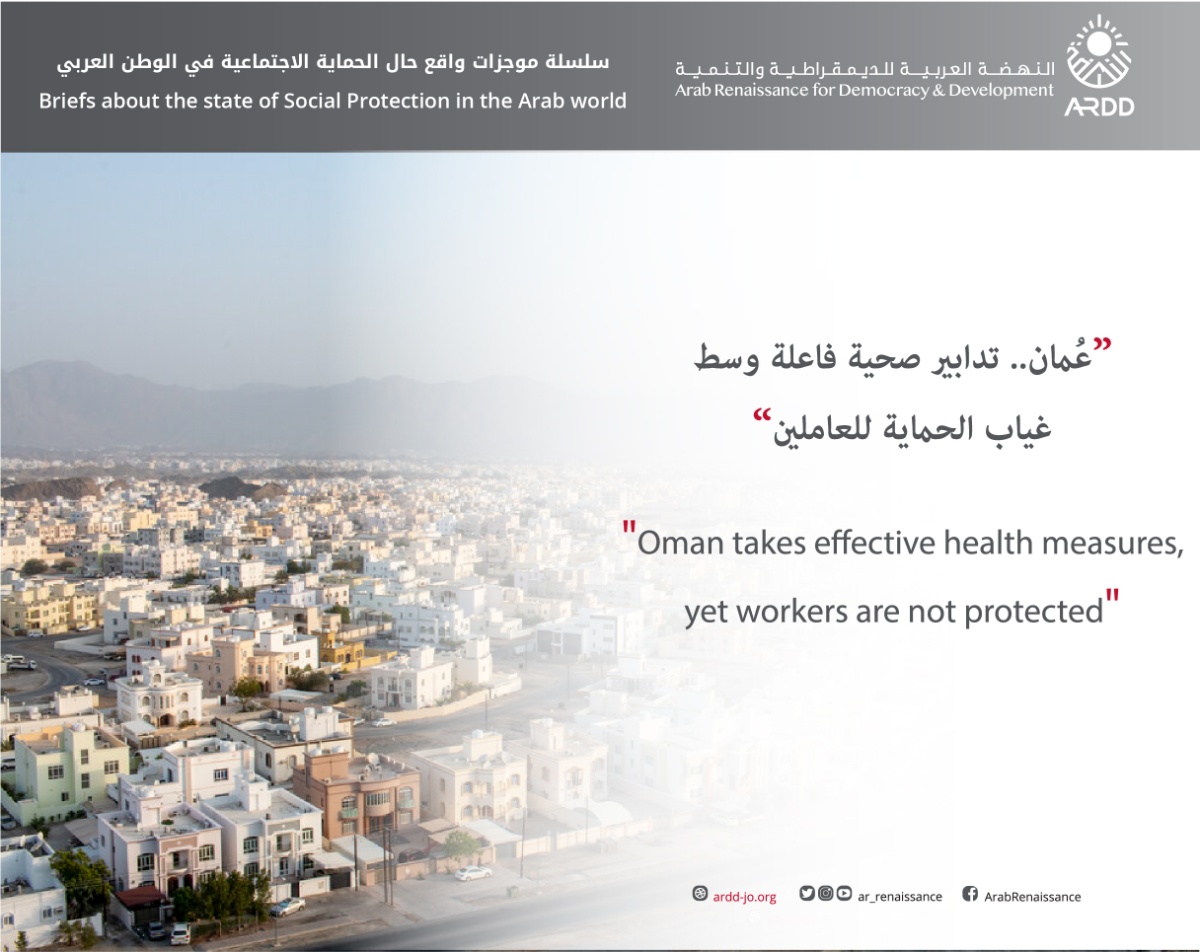Oman has the lowest number of coronavirus cases in the Gulf region, but the pandemic worsened the financial crisis it has been going through due to the decline in oil revenue.
The country registered the lowest number of cases in the Gulf area due to the government’s handling of the crises; it worked to raise awareness, spread information regarding preventive measures and the need to observe physical distancing, and to gain people’s trust.(1)
In this brief, the Arab Renaissance for Democracy and Development (ARDD) documents the measures and responses of the Sultanate of Oman to the corona pandemic, as well as the measures it took to protect vulnerable groups such as the poor, the elderly, children, migrants, refugees and people with disabilities. ARDD has been producing a series of briefs about the reality of social protection in the Arab world; this is part of this endeavour.
The Sultanate excels in the public health domain. To cope with the pandemic, it created a network of isolation and care centres throughout the country, provides free health care for all residents, allocated special rooms for the coronavirus patients, and committed to carrying out daily local tests.(2)
The Sultanate’s outstanding health sector, however, did not help it avoid the “big” crisis of “social inequality”. The pandemic underscored the difficult living conditions of guest workers cramped in work camps or old flats, and for whom self-isolation is more costly than for Omanis.(3)
For the elderly, the Sultanate introduced the “virtual clinic” service the enables patients to contact by phone doctors who evaluate their situation and give them treatment plans. It also published guidelines specifically for the elderly.(4)
While the rights of the children in the Arab world were severely affected by the corona pandemic, Oman excelled in providing social protection to children. The country ranked 2nd in the Arab world and 21st globally in the child rights index for the year 2020.(5)
More than 600 prisoners, including 336 foreigners, were pardoned, with Oman joining many other countries around the world in preventing the spread of the coronavirus.(6)
Just like the Himmat Watan initiative in Jordan, Oman opened a bank account for donations to fight the pandemic and donations started pouring in. Sultan of Oman Haitham bin Tariq donated $25 million; citizens, businessmen and various companies and institutions followed suit.(7)
A small Omani firm specialised in 3D printing came to the help of various health institutions to which it gave, with the help of youth volunteers, ventilators, bag valves, masks and other equipment it produced for free.(8)
And just like in most Arab countries, young Omanis launched the initiative “Wareed”, whose aim is to deliver medication and prescriptions free of charge for a month to people with chronic diseases, such as diabetes, heart conditions and hypertension, and help them avoid going to the hospitals.(9)
Many businessmen also contributed to fighting the pandemic by offering their properties and hotels to the government to use to quarantine patients.
The Sultanate introduced an interest-free emergency loans programme to support entrepreneurs whose businesses are affected by the pandemic, which is part of the state’s effort to control the negative effects of the pandemic on the economy.(10)
However, the decline in China’s demand for oil after the spread of corona, and the ensuing decline in oil prices, poses risks to Oman, putting the country’s future and the new Sultan to an early, and difficult, economic test.
(1) Fighting corona in Oman… How did the Sultanate manage to control the spread?
(2,3) Oman. Immigrants and women are the first victims of Covid-19
(4) This is how the Gulf countries protected their elderly during the ‘corona’ crisis
(5) Oman ranked second in the child rights index for 2020
(6) Hundreds of prisoners pardoned during the corona crisis
(7, 8, 9) Hundreds of Arab initiatives launched to fight the corona pandemic
(10) Oman launches an emergency loans programme to support the groups most harmed by corona


